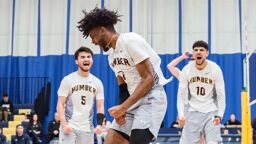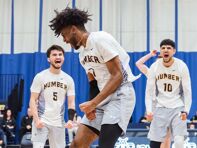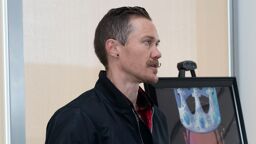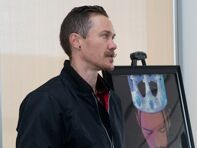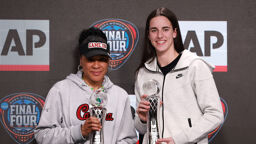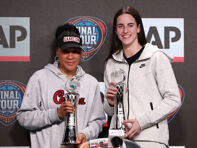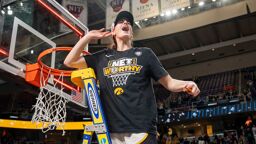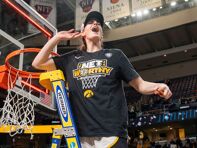About three weeks ago, an organization called Athlete Ally emailed individuals at the FBS Power Five conferences and their member schools about an “Athletic Equality Index” the organization was putting together.
The index was said to be designed to measure how inclusive a school’s athletics department was for LGBTQ people. It rated every school on eight categories, including having a non-discrimination policy, an LGBTQ student-athlete group and a fan code of conduct.
“While we’ve made tremendous progress in our efforts to build inclusive athletic environments over the past six years, the progress remains patchwork, with teams, leagues and governing bodies operating inconsistently in how they handle LGBTQ respect and inclusion,” said Athlete Ally spokesperson Taylor Carr.
The initial report was distributed to all of the schools, with each school’s score. Almost every FBS Power 5 school received an initial score below 70 — the equivalent of a D or F — which had been determined through Internet searches. [NOTE: Athlete Ally has since criticized any categorization of a grade as “failing,” and the organization responded to this article.]
Various administrators, who have been working at these schools to build inclusive environments, found their initial scores totally misinformed. They also found them embarrassing, given that they were distributed widely to their colleagues and rivals.
"Most of it's wrong,” Univ. of Oregon assistant athletic director Katie Harbert told Outsports. The initial report gave Oregon, which an out gay rival athletic administrator called a “model” program on LGBTQ inclusion, a failing score of 57.5.
“That's a big problem. Their information was not accurate. For our school it was at least 50% inaccurate.”
“We hope that the will act as a catalyst for every NCAA member institution to adopt proactive LGBTQ-inclusive policies and practices.”
Athlete Ally gave each school the chance to improve its score by working with the group. Only by working with Athlete Ally was Oregon able to improve its final score, a seemingly more-appropriate 95.
Scores changed sometimes dramatically when a school contacted Athlete Ally. If a school didn’t respond to Athlete Ally’s request for information, their grade — including some egregious misinformation — has now been made public regardless.
And that’s been the rub with almost every school interviewed about the organization’s report: There was little effort to understand the true environment of the athletics departments for LGBTQ student-athletes, coaches and administrators, instead relying on an academic checklist.
"If they're trying to drum up business for themselves, there's no way I'm going to call them up if that's how they do business,” Harbert said.
Failing grades abound despite widespread acceptance
One school that received a final failing final grade of 53 was Kansas State University. The Wildcats recently boasted the first publicly out gay FBS college football player in history to play in a game, Scott Frantz. Frantz has told every media outlet that he has been completely accepted by his team, coaching staff and administration since coming out to them many months ago.
Kansas State also has an out women’s soccer coach, Jessica Smith, who said she has received “unbelievable” support from the school since coming out. Other out LGBTQ people in the Kansas State athletics department in the last two years, including Cameron Banning, Cody Derby and Brandon Meier, have all reported acceptance at Kansas State.
Jill Shields, Deputy Athletics Director and Senior Women’s Administrator at Kansas State, was surprised by the failing grade and questioned the legitimacy of Athlete Ally’s efforts.
“I'd be curious as to the validity of the index,” Shields said. “We provide in-depth information annually for the Campus Pride survey through our LGBTQ campus office, and we are far from an ‘F.’”
Campus Pride, which focuses on schools self-reporting information, recently named Kansas State one of the top 25 schools in the country for LGBTQ students. The school just last weekend also unveiled a video dedicated to diversity and inclusion — specifically mentioning sexual orientation — at its football home opener.
Incidentally, the only other two schools to have ever had a publicly out gay active football player — Arizona State with Chip Serafin and Arizona with My-King Johnson — both also received failing grades in the final report.
Iowa State University also took exception to its final grade of 58 from Athlete Ally.
"We work closely with our campus partners in our LGBTQ Center, and we have varying methods of ensuring that our student-athletes know our commitment and dedication to having an inclusive environment, including staff and student-athlete education & assessment,” Calli Sanders, Senior Associate Athletics Director at Iowa State Univ., said.
“We are obviously disappointed that the ‘report’ didn’t get to know us before issuing an initial grade,” Sanders added, “but we know the good work we are doing and we take pride in our efforts."
Iowa State’s NCAA champion and Olympic hopeful Tina Hillman came out publicly on Outsports and talked about the support she has received from her Cyclones athletics community.

Notre Dame gets failing grade despite reported acceptance in sports
Notre Dame received only 40 of the possible 100 points on the organization’s final report — one of the worst grades given — despite the school having over a dozen out student-athletes and several out administrators, including leaders in the athletics department. One former athlete, softball player Sarah Marsh, pointed to the Fighting Irish athletics department as being a respite for LGBTQ student-athletes and more accepting than the school’s general culture, even when was there from 2004-08.
"The athletics community at Notre Dame [was] very diverse in terms of countries, religions, ethnicities, sexuality, gender, everything," Marsh told Katie Barnes of ESPNW earlier this year. "The other 90 percent of campus was not diverse, and I did not feel safe being who I was."
In addition, the Notre Dame men’s tennis team totally accepted openly gay player Matt Dooley when he came out privately and then publicly.
Notre Dame also featured student-athletes, coaches and staff in a You Can Play video designed to welcome all LGBTQ people into the athletics department.
“Because the university values LGBTQ students in the Notre Dame community,” athletic director Jack Swarbick proclaimed in the video, “as indeed it values all of its students, the university is committed to fostering an environment of welcome and mutual respect that is grounded in its catholic mission.”
Jill Bordensteiner is Senior Associate Athletics Director at Notre Dame, and is totally out and supported in the athletics department. She admitted that the athletics department is not perfect, and that some of the Catholic school’s written policies were behind where she would like to see them. Yet she said the environment within the Fighting Irish athletics department has made incredible strides and is far from the grade given to it.
"The response when I came out was profoundly, incredibly positive,” Bodensteiner said. “Great comments, great questions. My colleagues from football sent me notes that they were happy for me, and that this is a place of inclusion. My inbox was filled with messages of support."
Bodensteiner added that another senior leader in a very public position recently married her wife, and that it was met with embrace and celebration throughout the athletics department. The school has also provided her, and every other same-sex married couple, equal benefits.
"Our score just doesn't reflect reality. We have many LGBTQ student-athletes and they are thriving."
"Our score just doesn't reflect reality,” Bodensteiner said. “We have many LGBTQ student-athletes and they are thriving."
To be sure, the index gets some things right. While receiving an initial grade of C- from Athlete Ally’s Internet research, Stanford University got a perfect score of 100 on the final index. Stanford has had the most publicly out LGBTQ athletes in all of NCAA sports, almost double the next-closest school, Purdue.
Also, one of Athlete Ally’s motives in particular stands out as important. Transgender athletes are often the forgotten letter in LGBTQ. The group hopes to highlight that component, and has assigned 10% of the grade to make sure a school adheres to NCAA guidelines on trans inclusion.
“With only nine of the 65 schools in the Power 5 adhering to the NCAA's guidelines on transgender athlete participation, we believe an industry-wide framework and benchmark is needed for assessing, amplifying, and institutionalizing LGBTQ ‘allyship’ in a way that celebrates progress as much as it discourages prejudice,” Carr said.
Egregious errors feature Ohio State athletic director
Yet one of the most egregiously incorrect grades on the entire report was Ohio State’s grade of zero for “outspoken or allied staff.” The Ohio State Buckeyes athletic director Gene Smith has spoken publicly to Outsports about his support of LGBTQ issues and his gay daughter, and earlier this year he was honored by Equality Ohio for his outspoken support of the community.
“We promote diversity on all levels,” Smith said. “I’ve been in the business for 30 years, and I’ve always believed that administrations should be supportive and reflective of the student-athletes.”
Smith’s comments and his support for LGBTQ inclusion have been widely reported and are easily found on Google and every other search engine. Their omission in a public report based on Internet searches is disturbing.
"A group like Athlete Ally, because they want to be hired to do more work in that space, they promote an inaccurate reality that is negative and not accepting,” said UCLA assistant softball coach Kirk Walker, who is openly gay. “It actually perpetuates athletes, coaches and staff to be fearful and remain non-visible."
UCLA’s final grade was an 82.5, but the school received an initial score of 70 out of a possible 100 from Athlete Ally in its initial report, sent to schools on Aug. 21. The organization demanded a response from institutions by Sept. 5, or their poor score would be released by Sept. 12. The response time was just as student-athletes returned to campus, and during the kickoff of the college football season (each school had been selected by Athlete Ally because of its football program). That made it difficult to ascertain responses.
“Researchers performed a comprehensive audit of handbooks, policy manuals, campus materials, social media, news sources and more in order to identify the outlined policies and practices,” Carr said. “From there, member institutions were given approximately a month to review and advise if in fact policies and practices were in place, and may not have been accessible for a number of reasons.”
It’s difficult to see how this index would pass any academic test of research validity.
Walker referred to these tactics as “bullying” and “blackmail.”
Oregon State Univ., Walker’s former school where he came out publicly and was completely accepted by the university staff, coaches and student-athletes a decade ago, received a failing initial grade of 57.5, which was then improved to an 80.
That some schools were able to improve their score by working with Athlete Ally underlines the lack of validity of the organization’s research. It also raises questions as to why the group would include any school with which it was not able to receive a response to its inquiries, given how much scores changed for those schools that did respond.
It’s difficult to see how this index would pass any academic test of research validity.
Dr. Christina Rivera, Sr. Associate Athletic Director and Senior Women Administrator at UCLA, was abhorred by Athlete Ally’s initial conclusions. Rivera has been openly gay in the Bruins athletics department since she was hired by the school 10 years ago. She routinely brings her wife and son to athletic events and has found the atmosphere in Westwood to be completely accepting of her family.
“The love that I receive not just from my colleagues and our coaches but the student-athletes who just love my family, they would ask me how i felt when I was pregnant, what was going on, do I know if it's a boy or a girl, they followed my journey,” Rivera said. “So I really felt the love when I was pregnant because everyone was so excited for me and my wife, and they couldn't wait to meet our child.”
“I really felt the love when I was pregnant because everyone was so excited for me and my wife, and they couldn't wait to meet our child.”
Group hopes good comes from index
Helen Carroll, the trailblazing LGBTQ-sports advocate and former women’s basketball coach at UNC-Asheville, said she hopes some good comes from the index, and that schools will use the index as a way of focusing on important inclusion efforts.
“We've had a hard time getting some schools to get some work done,” Carroll said. She wrote a foreword for the index. “This gives them a new way to look at what they're doing and how they’re doing it. It's a hands-on visual report."
For Harbert, one of the many issues with Athlete Ally’s efforts is the failure to include schools from the initial stages of its efforts. Instead, the organization tasked people to search the internet for answers. Then in late August, as administrators were dealing with students returning and the start of the school year, the organization tasked them with fixing their index.
“To me the spirit of inclusion is the key, and the fact that they didn’t include us in the process from the start goes against that inclusion attitude,” Harbert said. Oregon is part of the LGBT SportSafe founders club. “We're not going to just post online who are our out staff. Not everything needs to be posted on the Internet."
Several other schools who received poor final grades from Athlete Ally are part of the LGBT SportSafe founders club, including Nebraska (D), Northwestern (C+) and Colorado (C+). In addition, 10 schools that appeared in Campus Pride’s top-25 schools for LGBTQ students appeared in Athlete Ally’s index, with an average score of a C-.
Of the nine schools listed on the organization’s Web site as having an active Athlete Ally organization on campus, none received a failing final grade. Over 40% of schools without an Athlete Ally group received a failing grade.
Carroll thought that any score over 50 showed the school athletics department was headed in the right direction. Carr said Athlete Ally hoped the index would spur more action.
“We hope that this will act as a catalyst for every NCAA member institution to adopt proactive LGBTQ-inclusive policies and practices,” Carr said.
Instead, Rivera said the index would do absolutely nothing to affect UCLA’s efforts on LGBTQ inclusion because the school is already, despite Athlete Ally’s score, totally committed to equality and inclusion.
“It stems from the university culture,” Rivera said, adding that they have over a half-dozen totally out coaches and administrators at the school. “We're fortunate to be working on a campus that has been a pioneer in diversity and inclusion and social justice. Out my window right now I can see the number 42 for Jackie Robinson, and the Arthur Ashe Health Center. Ann Meyers Drysdale broke the gender Barrier for us. This is what we do at UCLA. You come here knowing you can be who you want to be.”
Harbert reiterated the same sentiment, saying the school had already been engaged in these conversations for years.
"If they publish the index, that's fine, but it's not going to impact what we're doing or why we're doing it,” Harbert said.
One main concern for those we spoke to was that this index would do more harm than good, perpetuating an idea that college athletics is not a safe space for LGBTQ people. Over 63% of schools received a D or worse, and less than 8% received an A. According to those we spoke to, that does not remotely reflect the current state of LGBTQ inclusion in major NCAA sports.
It was only by working with Athlete Ally on the index that a school could improve its score.
"As someone who is out in athletics, it's insulting because they don’t know what they are talking about,” commented Walker. He said the elements highlighted in the organization’s index did not represent acceptance or inclusion. Statements in a handbook or a manual, or a petition, help no one come out or be themselves,” Walker said.
The role of out LGBTQ people diminished in report
Walker pointed to his own story and those of countless others as reasons for hope, despite the drastically low scores on the index.
"What we are seeing in college athletics repeatedly across the country, even in places like Kansas or potentially the South, athletics is a community that cares about the people in the community. The perception that they are not welcoming of individuals who happen to be LGBT is not reality."
We have seen this play out across college sports in the last few years.
Out LGBTQ student-athletes, coaches and administrators at various schools that received poor scores from Athlete Ally have publicly reported total acceptance. These include Arizona football player My-King Johnson, swimmer Matt Korman at Texas, Univ. of Missouri football player Michael Sam, Tennessee rower Chandler Frumin, Arizona State football player Chip Sarafin, West Virginia diver Alex Obendorf and Univ. of Nebraska’s Jace Anderson.
It begs the question of what is a better indicator of an inclusive atmosphere: Out LGBTQ people reporting total acceptance, or a checklist filled out by Internet searches and phone calls?
The index placed virtually no value on having out LGBTQ people in the athletics department, instead focusing on elements that Athlete Ally can best help a school create, like an inclusion policy or an on-campus organization.
“The presence of out LGBTQ people in an athletic department is important indicator of an inclusive athletic environment,” Carr said, “but without accessible and codified policies and practices that truly protect LGBTQ players, fans, coaches, officials and administrators, we leave the LGBTQ community vulnerable and open to numerous forms of potential discrimination.”
That thought process doesn’t sit well with many out LGBTQ people seeing first-hand the importance of their presence.
"My frustration and concern about this survey in particular is that they are very much about a checkoff list of compliance,” Walker said. “That has very little to do with what's going on in an athletic department at a university.
“In this day and age we have so many LGBTQ individuals who are closeted, out professionally and out personally, in virtually every athletic department across the country. And those individuals are not really being sought out to really discuss the culture and the climate for an LGBT athlete, coach or administrator.”
You can read the stories of hundreds of publicly out LGBTQ athletes, coaches and administrators, who are totally accepted by their colleagues in high school, college and pro sports, by venturing to Outsports’ coming-out section.







